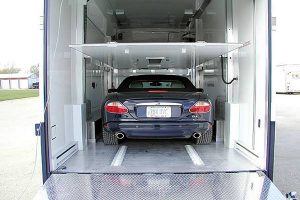Understanding The Need For Insurance In Electric Car Shipping
Shipping an electric car involves a unique set of considerations, making insurance a critical component of the process. Unlike traditional vehicles, electric cars come with sophisticated and often expensive technology, such as high-capacity batteries and intricate electronic systems. These components are not only costly to repair or replace but also require specialized knowledge to handle properly. The value of these cars can be significantly higher than their gasoline counterparts, intensifying the financial risk during transport.
Understanding the need for insurance in electric car shipping begins with recognizing these inherent vulnerabilities. During transportation, whether by land or sea, vehicles are exposed to a range of potential hazards including accidents, theft, and environmental damage like storms or saltwater exposure. For electric cars specifically, improper handling can lead to severe battery damage or software malfunctions that compromise the vehicle’s performance and safety.
Insurance provides a safety net against such unforeseen incidents. It ensures that owners are financially protected in the event of any damage occurring during transit. Given that repairs for electric vehicles can be particularly costly due to their specialized parts and labor requirements, having comprehensive insurance coverage becomes even more crucial.
Moreover, many shipping companies have recognized this necessity and offer tailored insurance packages designed specifically for electric cars. These packages often cover a broader range of risks associated with transporting high-tech vehicles and provide peace of mind for both shippers and recipients.
In sum, understanding the need for insurance when shipping an electric car is about appreciating the financial implications tied to potential damages and ensuring adequate protection against those risks. This is why securing appropriate insurance coverage is not just advisable—it’s essential for safeguarding your investment in advanced automotive technology during transit.
Types Of Insurance Coverage Available For Electric Cars
When shipping electric cars, insurance coverage is a critical consideration to ensure protection against potential risks during transit. Shipping companies typically offer several types of insurance coverage specifically tailored to the unique needs of electric vehicles. These policies are designed to address the distinct characteristics and vulnerabilities associated with transporting electric cars.
One primary type of coverage is comprehensive insurance, which provides extensive protection against various forms of damage that might occur while the vehicle is in transit. This includes coverage for accidental damage, theft, vandalism, and natural disasters such as storms or floods. Given the high value and sophisticated technology embedded in electric cars, comprehensive insurance ensures that any unforeseen incidents do not result in significant financial losses.
Another essential type of coverage is liability insurance. This protects against claims arising from damage caused by the transported vehicle to third parties or their property during the shipping process. Liability insurance is crucial for safeguarding both the owner and the shipping company from potential legal and financial repercussions.
Additionally, some shipping companies offer specialized coverage for battery-related issues. Electric car batteries are not only expensive but also sensitive to extreme conditions such as temperature fluctuations and physical impacts. Specialized battery insurance can cover damages specific to this vital component, ensuring that any repair or replacement costs are adequately managed.
Finally, there may be options for gap insurance which covers any difference between what standard policies pay out and what is actually owed on a financed vehicle if it gets totaled during transit. This can be particularly useful given that electric cars often have higher purchase prices compared to their gasoline counterparts.
Overall, these various types of insurance provide a comprehensive safety net tailored specifically for electric vehicles, offering peace of mind to owners entrusting their valuable assets to shipping companies.
Major Shipping Companies That Offer Insurance For Electric Vehicles
When considering the transportation of electric vehicles (EVs), insurance coverage is a vital aspect that potential shippers must evaluate. Many major shipping companies have recognized the growing market for EVs and now offer specialized insurance policies to cater to this segment. These policies are designed to address the unique needs and risks associated with transporting electric cars, from battery integrity to sophisticated onboard technology.
One prominent player in this field is DHL Global Forwarding, which has expanded its service offerings to include comprehensive insurance plans tailored for EV shipments. They provide coverage options that encompass various contingencies such as damage during transit, theft, and even specific risks related to the EV’s battery system. Their expertise in logistics ensures that electric vehicles are handled with care and precision throughout the shipping process.
Similarly, Maersk Line has integrated robust insurance solutions into their EV transport services. Recognizing the distinct requirements of electric cars, Maersk offers policies that safeguard against potential damages during sea freight. This includes coverage for mechanical failures or environmental factors that could impact an EV’s sensitive components.
Another significant contributor is Kuehne + Nagel, which provides a suite of insurance products specifically designed for high-value items like electric vehicles. Their global network allows them to offer seamless door-to-door service with comprehensive insurance options that cover every stage of transport.
These companies not only provide peace of mind through their specialized insurance offerings but also demonstrate an understanding of the intricacies involved in shipping electric vehicles. By offering tailored solutions, they ensure that customers’ investments in cutting-edge automotive technology are well-protected throughout their journey from one location to another.
Comparing Insurance Policies: What To Look For
When comparing insurance policies for shipping electric cars, several critical factors must be considered to ensure comprehensive coverage and peace of mind. Firstly, it’s crucial to examine the scope of coverage provided by different insurers. Some policies might only cover damages that occur during transit, while others extend to include loading and unloading incidents or even theft. Understanding these nuances can help in selecting a policy that aligns with your specific needs.
Another essential aspect is the valuation process for your electric car. Insurers may use different methods to determine the car’s worth in case of damage or loss. Some might base their calculations on market value, while others could offer agreed value policies where you and the insurer agree on a set amount beforehand. Knowing how your car will be valued can prevent any unpleasant surprises when filing a claim.
Additionally, consider the exclusions listed in each policy. Exclusions are specific scenarios or conditions under which the insurance will not pay out claims. These could range from natural disasters like floods and earthquakes to man-made issues such as acts of vandalism or even mechanical failures specific to electric vehicles.
The customer service reputation of an insurer also plays a significant role in your decision-making process. Efficient claim processing and responsive customer support can make a significant difference when dealing with stressful situations like vehicle damage during shipping.
Lastly, cost is always an important factor but should not be the sole determinant. Cheaper premiums often come with higher deductibles or less comprehensive coverage, so balancing cost against coverage benefits is key to making an informed decision.
By thoroughly analyzing these elements—scope of coverage, valuation method, exclusions, customer service reputation, and cost—you can choose an insurance policy that best protects your valuable electric car during its journey from point A to point B.
Cost Factors: How Much Does Shipping Insurance For Electric Cars Cost?
When considering the shipping of an electric car, one crucial element to factor in is the cost of shipping insurance. The pricing for this insurance is influenced by a variety of factors that collectively determine the overall expense. Firstly, the value of the electric car itself plays a significant role. Higher-value vehicles naturally incur higher insurance costs due to the increased financial risk involved in transporting such valuable cargo.
Another critical factor is the distance and route of transportation. Shipping an electric car internationally or over long distances typically results in higher insurance premiums compared to domestic or shorter routes, primarily due to the extended exposure to potential risks and hazards along the way. Additionally, certain routes may be deemed more perilous than others, influencing insurance rates accordingly.
The mode of transport also affects insurance costs. Whether opting for open or enclosed carrier services can make a substantial difference; enclosed carriers provide additional protection but are more expensive both in terms of shipping and insurance fees. This is especially pertinent for high-end electric cars that require extra care during transit.
Moreover, specific features unique to electric cars can influence insurance costs. Elements such as battery type and placement might necessitate specialized handling and storage conditions during transport, potentially increasing premiums due to these additional precautions.
Lastly, individual shipping companies have their own pricing structures based on their experience, reliability, and coverage options offered. Comparing quotes from different providers can offer insight into competitive rates while ensuring comprehensive coverage tailored to your specific needs.
In essence, while various factors contribute to the cost of shipping insurance for electric cars—vehicle value, distance and route complexity, transport method, unique vehicle features—diligent research and comparison can help identify a balanced option that ensures your vehicle’s safety without exorbitant expenses.
Steps To Secure Insurance When Shipping Your Electric Car
When shipping an electric car, securing insurance is a crucial step to ensure peace of mind during the vehicle’s journey. The process begins with thorough research. Start by contacting your chosen shipping company to inquire about their insurance policies specific to electric cars. Not all companies offer the same level of coverage, and understanding what is included or excluded is vital.
Once you have gathered information from different shippers, assess the coverage options available. Look for policies that cover potential damages unique to electric vehicles, such as battery issues or electronic component failures that might occur during transit. Compare these offerings against your needs and budget.
The next step involves verifying the insurance details in writing. Request a copy of the insurance policy and scrutinize it carefully. Pay close attention to terms and conditions, especially any clauses related to exclusions or limitations on coverage for electric cars. If anything seems unclear or inadequate, seek clarification from the shipping company.
It’s also wise to consider supplemental insurance if the standard policy does not fully cover your concerns. Some third-party insurers provide additional coverage tailored specifically for high-value or specialized vehicles like electric cars.
Before finalizing any agreements, document your car’s condition thoroughly with photos and detailed notes. This documentation will be invaluable in case you need to file a claim later on.
Finally, keep open lines of communication with both the shipping company and insurer throughout the process. Confirm key details such as pickup and delivery times, routes taken, and contact information for any issues that might arise during transit.
By following these steps diligently, you can ensure comprehensive insurance coverage for your electric car while it is being shipped, safeguarding your investment against unforeseen incidents along its journey.
Tips For Filing A Claim If Your Electric Car Is Damaged During Shipping
Filing a claim for damages sustained by your electric car during shipping can be a complex process, but understanding the steps involved and preparing adequately can make it more manageable. Start by documenting the condition of your vehicle meticulously before it is handed over to the shipping company. Take comprehensive photographs from multiple angles, focusing on any pre-existing scratches, dents, or other imperfections.
This visual record will serve as crucial evidence if you need to prove that new damage occurred during transit.
Once you receive your electric car at its destination, inspect it thoroughly before signing off on any delivery documents. Look for any signs of damage that were not present when you initially documented the car’s condition. If you find any issues, note them immediately on the delivery receipt and take additional photographs to capture the new damage.
Promptly report any discovered damage to the shipping company and your insurance provider. Time is often of the essence in these matters; many insurance policies have specific time frames within which claims must be filed. Provide all necessary documentation including photographs, receipts for repairs or estimates, and any correspondence with the shipping company regarding the incident.
Communicate clearly and assertively with both parties throughout this process. Keep detailed records of all interactions, including emails and phone calls. If there are delays or disputes regarding liability or coverage, having a well-documented account will support your case.
Lastly, familiarize yourself with both your own auto insurance policy and that offered by the shipping company prior to shipment. Understanding what is covered under each policy will help manage expectations and streamline communication if an issue arises during transportation.
By taking these steps seriously, you’ll be better prepared to file a successful claim if your electric car sustains damage during shipping.








